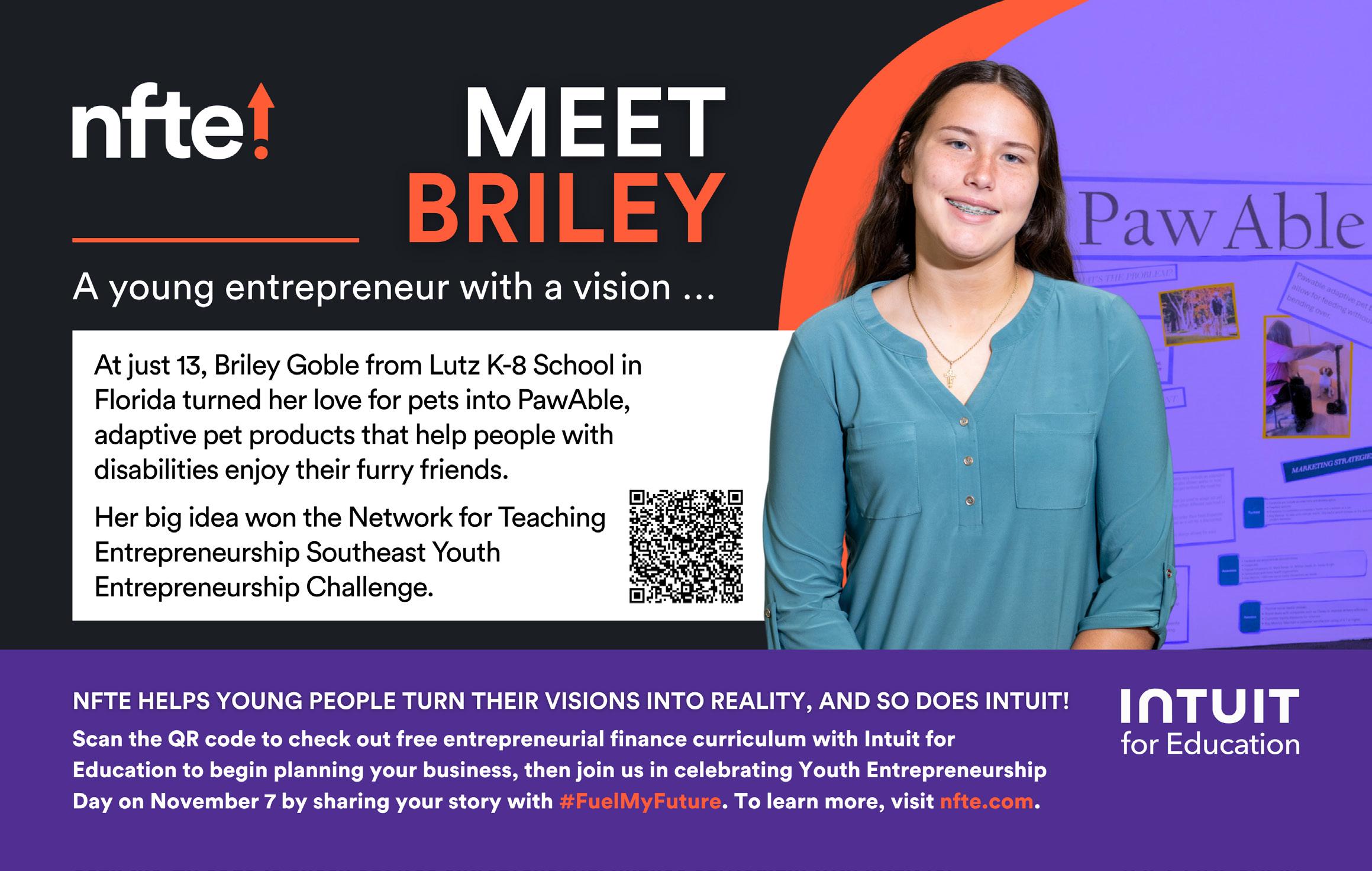BUILDING YOUR BRAND TOP BUSINESS SKILLS EVERY TEEN SHOULD START LEARNING NOW BEST COLLEGE MAJORS FOR FUTURE ENTREPRENEURS INSIDE:



















BUILDING YOUR BRAND TOP BUSINESS SKILLS EVERY TEEN SHOULD START LEARNING NOW BEST COLLEGE MAJORS FOR FUTURE ENTREPRENEURS INSIDE:


















n a world that changes faster than a viral trend, one thing remains constant: the need for smart, driven people who know how to build, market, and manage. Business skills aren’t niche — they’re the universal engine propelling every industry, including STEM, healthcare, and the arts. A foundation in business and entrepreneurship is one of the smartest investments you can make.
This guide can help you figure out why a career in business (or starting your own company) might be a good fit for your goals. We’ve packed its pages with practical advice, from suggested classes to take in high school and colleges with highly-rated business programs, to an overview of suggested majors, and an extensive section of hands-on experiences: the pre-college programs, summer camps, and internships that will let you test-drive your ideas, develop your business savvy, and build a competitive resume. We invite you to explore the articles and check out your favorite opportunities (click on each organization’s name or complete this form to get more info).
Turn your ambition into action and use this guide as your first business plan — a roadmap for investing in your most valuable asset: you.

PUBLISHER
TeenLife Media, teenlife.com
EDITOR
Editor-in-ChiefNancy Li, nancy@teenlife.com
Managing EditorJodi Ireland, jodi@teenlife.com
Associate Editor - Stefanie Tedards, stedards@joincollegeadvisor.com
ADVERTISING SALES
Director of SalesBrenda Boos, brenda@teenlife.com
Sales Account ManagerJen Fisher, jen@teenlife.com
Sales Account ManagerGina Messina, gina@teenlife.com
Sales & Support AssociateRegan Beiermann, regan@teenlife.com
DISTRIBUTION
Digital Marketing ManagerDustin Silvaer, dustin@teenlife.com
DESIGNER
Kathy Tilton, kbtilton@gmail.com
To download a PDF of this Guide, go to: teenlife.com/guides/yfi-business
To connect with opportunities found in this guide, go to: teenlife.com/request-yfi-business



By Jodi Ireland
e tend to toss around the terms “business” and “entrepreneurship” pretty interchangeably, but they’re not the same thing. Think of it this way: all entrepreneurs start a business, but not all businesses are started by entrepreneurs (in the purest sense of the word).
At its core, a business creates, delivers, and sells a product or service to meet customers’ needs and make a profit. Entrepreneurship, however, involves innovation, risk-taking, and identifying new opportunities to solve problems in ways that haven’t been done before — and it’s a journey that can lead to rapid growth and market disruption.
FOCUS AND GOAL: STABILITY VS. DISRUPTION
The business mindset
A traditional business approach focuses on stability, consistency, and optimizing existing models. The goal? Maximizing efficiency and profit within an established market.
Example: You plan to open a new sandwich shop in your hometown. You’re entering a highly competitive market (food service), but you know you’ll succeed by offering excellent quality, friendly service, and a convenient location. Plus, there aren’t any other sandwich shops nearby. This business model (selling sandwiches) is proven. Your job is to execute it well.
The key traits associated with a successful business include consistency, following a business plan, and effective operational management.
The entrepreneurial mindset
An entrepreneur is a visionary who identifies a gap in the market or a novel solution to a common problem. These people focus on innovation, rapid scaling (growth), and disrupting the status quo.
Example: Think about DoorDash or other similar food delivery apps. Before they existed, people ordered food for delivery by calling a single restaurant. DoorDash didn’t invent the restaurant or delivery; its founders — four Stanford University
students (Tony Xu, Stanley Tang, Andy Fang, and Evan Moore) — simply identified a need in their community. What began as a class project to solve a problem (helping local restaurants deliver food more efficiently) grew into a multibillion-dollar company. These students invented the process by creating a platform that connects thousands of restaurants, customers, and independent drivers. This entirely new model revolutionized the way people eat and how restaurants operate.
The key traits associated with entrepreneurship include creativity, risk-tolerance, visionary thinking, comfort with uncertainty, and a willingness to dream big and focus on large-scale growth.
Starting a business involves managed risk. You know the market. You know the competition. You can generally predict potential income and expenses based on industry standards.
Is there any financial risk? Sure. You might need a small business loan, and there’s no guarantee you’ll attract enough local customers to cover rent and salaries. The rewards if you do? Steady income and local success.
Take our sandwich shop. Its goal is predictable: steady annual growth by attracting new customers, maintaining a stable customer base, and providing reliable service. Its risks — losing a few customers, prices for ingredients and supplies increasing, and building rent going up — are generally manageable.
Entrepreneurship, on the other hand, involves much higher risk. Because the idea is new, there’s no guarantee the market will accept it. About 90% of startups fail for a variety of reasons, like lack of market interest, poor financial planning, competition, and struggles with the product or marketing approach. But if you can unlock the key to positioning yourself in that 10%, the potential reward is exponentially greater — the chance to build a billion-dollar company (like DoorDash!) and fundamentally change an industry.
Many entrepreneurs put their life savings and often venture capital (investor money) into an unproven idea. If it fails, they can lose everything. If it succeeds, the reward can be massive, global-level success.
Ever stay at an Airbnb? Its founders faced tremendous risk. No one believed that people would let strangers sleep on their couch or in a spare room. But Joe Gebbia, one of the founders, had an experience that planted the seed for this company. While studying at the Rhode Island School of Design, he let a complete stranger sleep on an air mattress in his apartment. He was a little apprehensive, but the stay was smooth.
A couple of years later, after moving to San Francisco, he revisited the concept when he noticed a shortage of accommodations. The city was hosting a major design conference, and hotel rooms were limited. Gebbia and his roommates decided to host three guests, who each paid $20 per night to sleep on air mattresses. This successful trial run convinced them of their idea’s potential, which later evolved into Airbnb.
FOLLOWING THE RULES VS. MAKING THEM
Execution and following the plan
In a typical business, success comes from excellent execution of a tried-and-true formula, with established practices guiding operations. The structure is often hierarchical and standardized.
For example, a national restaurant chain follows the established rules of the restaurant industry and the example of the original restaurant. The chain operates by the book, with standardized decor, layout, and menus, safety protocols, hiring and training procedures, and employee scheduling.
Pivoting and creating the rules
Entrepreneurs often start with an idea (or hypothesis) and constantly test, fail, and pivot based on market feedback. They’re often building the plane while flying it, and the structure — at least initially — is flexible and chaotic.
Walt Disney initially created Oswald the Lucky Rabbit, which he “lost” in a financial dispute with distributor Charles Mintz. Eventually, Disney created Mickey Mouse, along with the brand we know and love.
As a Yale student, Frederick W. Smith earned a C on a delivery project. Later, he developed that idea into FedEx, a global leader in logistics and delivery.
Rejected by nearly 40 publishers, Arianna Huffington refused to give up her quest to become a published author. Ultimately, she founded The Huffington Post and Thrive Global.
TRADITIONAL BUSINESS
Primary goal
Profit, stability, consistency Innovation, disruption, rapid growth
Market approach Meets existing needs better Creates new needs
Risk level Manageable and predictable High and unpredictable
Growth rate
Steady, incremental Explosive, scalable Example Successful bakery, clothing store
Spotify (changed music consumption); OpenAI (revolutionized using GenAI)
YOUR PATH
Intrigued by business and entrepreneurship? Knowing the difference can help you choose the path that aligns with your personality and goals.
If you lean toward business
You may thrive on structure, clear processes, and optimization. You like seeing results from hard work and may prefer a stable career path. Consider taking high school classes, enrolling in summer programs, or pursuing a college major in financial management, marketing, or operations. You might gravitate toward a career as a manager, analyst, accountant, or marketing specialist. Maybe someday you’ll own a small business or franchise.
If you lean toward entrepreneurship
You’re likely a problem-solver, risk-taker, and creative thinker who’s comfortable with uncertainty and ambiguity. You want to build something entirely new. Consider classes and programs focused on design thinking, startup accelerators, or innovation challenges. Your future career may include roles such as founder, CEO of a startup, product developer, or venture capitalist.
Ultimately, both paths are valuable, rewarding, and contribute massively to the economy. Whether you want to run the best café in town (business) or create the next viral social media platform (entrepreneurship), understanding these distinctions is the first step toward building your successful future.

Thank you, UCLA Anderson School of Management and Summer Discovery, for an amazing three-week stay at UCLA!
During this time, I had the opportunity to explore the business side of sports, entertainment, and media. We heard from many educated and insightful guest speakers like Rudy Crew, [an educator, academic administrator, and the president of Medgar Evers College,] and Leonard, [a student studying geography and environmental studies with a minor in entrepreneurship at UCLA].
Throughout the program, I got lots of invaluable information and gained insight into what success looks like in the entertainment industry across different disciplines, including marketing, premium sales, networking, and producing. We also visited Warner Bros. Studios and Netflix’s headquarters. What I learned will undoubtedly shape and guide my future career decisions.
To complete the program, we took on a project challenge to expand the NFL into international markets. This project involved thorough research, production, and a final presentation of our strategy.
Thank you to Felisa, Nathan, Lily, and Nico for running the course! I couldn’t have asked for better instructors who were all outstanding teachers and role models.

- Bauer Berkley, Dallas, TX

Ready to move beyond the classroom and get some hands-on experience? If you’re curious about commerce, eager to explore the stock market, want to sharpen your business skills, or you’re contemplating your own start-up or already running a business and ready to level up, this section’s for you.
Explore top-tier summer and pre-college programs focused on business, finance, and entrepreneurship. You’ll find opportunities for everything from marketing and accounting fundamentals to venture capital and leadership. We’ve organized this section by program type and included details about each program to help you compare your options at a glance. Click on the links to go directly to each organization’s website for comprehensive details, dates, costs, and application information.
BENTLEY UNIVERSITY PRE-COLLEGE PROGRAMS | View Website
$3,380 (Residential)
$2,450 (Commuter)
$1,490 (Online)
10th, 11th, 12th
Online, In-Person
1 Week
A Pre-College program at Bentley University provides high school students with a taste of college academics and a chance to experience residential life and explore a university community. By immersing themselves in a rigorous yet supportive learning environment, students can gain valuable insights into their academic interests and career aspirations. Students develop meaningful friendships and form connections with like-minded peers from diverse backgrounds. Courses are 9:00 a.m. to 5:00 p.m. EST with breaks throughout the day. Learn more »
View Website
Varies 9th, 10th, 11th, 12th
Online, In-Person
1-3 Weeks
Students choose from over 70 courses in a dozen subject areas taught by expert instructors. Residential & Commuter: Students live on our Morningside Campus, a serene academic community where they will always be mere steps away from classrooms, libraries and amenities. Online Summer: Join our programs from anywhere in the world and experience interactive classes with high-achieving peers and dedicated instructors, engage in co-curricular activities, and access resources like our online library. Learn more »
DARTMOUTH PRECOLLEGE
$1,895
7th, 8th, 9th, 10th, 11th, 12th, College Online
Multi-length courses available throughout the year GEORGETOWN UNIVERSITY
Exploring a future in business? The Dartmouth Precollege Online Program lets motivated students ages 13 and up explore exciting business courses taught by top Dartmouth instructors, from anywhere in the world. Learn about cutting-edge topics like financial markets and entrepreneurial strategies while developing critical thinking and problemsolving skills. Through flexible lessons and mentor support, you can start building a strong foundation for your future in business. Learn more »
$1,895
8th, 9th, 10th, 11th, 12th, College Online
Multi-length courses available throughout the year
Do you dream of a future in business? Georgetown University’s Pre-College Online Program is your perfect opportunity to explore this dynamic field before college. Designed for high school students, the program offers in-depth courses in entrepreneurship, investing, marketing, and more, each featuring dynamic video lessons from renowned Georgetown faculty. Study at your own pace — anytime, anywhere — and gain a competitive edge by exploring business subjects that intrigue you most. Learn more »
GLOBAL BUSINESS ACADEMY | View Website
$2,900
9th, 10th, 11th, 12th
In-Person
8 days
Join top high school students this summer at a Global Business Academy in Belize, Panama or Greece. In this 8-day business consulting program, you will gain 30+ hours of consulting experience while supporting entrepreneurs to access essential financial services. You will develop your business skills alongside international business professionals, experiencing another country and culture while making an impact. No experience is required, but your skills will be put into action abroad. Sign up today! Learn more »
LAUNCHX SUMMER PROGRAMS | View Website
$1,995 - $11,495
9th, 10th, 11th, 12th, College
Online, In-Person
3-8 Weeks
We empower youth entrepreneurs. We offer programs for foundational knowledge, prototyping, consulting, starting a real business, and even intern placement in a startup. Wherever you are in your entrepreneurship journey, we have incredible programs for you!
• Winter BootCamp (December 29)
• Spring BootCamp (April 6)
• Online Startup Experience (June 1)
• Online Innovation Program (June 8)
• In-Person San Diego Exploration Program (June 28)
• Online Flagship Entrepreneurship Program (July 6)
• In-Person LocationX Flagship Program (July 13) Learn more »
11th, 12th
LMU’s Intro to Entrepreneurship Pre-College Program empowers high school students to explore business fundamentals, innovation, and leadership in a dynamic, hands-on environment. Through engaging workshops, mentorship from LMU faculty, and project development, students gain valuable skills that prepare them for college and future careers. Held on LMU’s beautiful Los Angeles campus, this summer experience fosters creativity, confidence, and collaboration — ideal for motivated teens ready to take their first steps into the world of entrepreneurship. Learn more »
| BUSINESS & ENTREPRENEURSHIP | View Website
$4,195 - $4,495
9th, 10th, 11th, 12th
In-Person
9 days
At the National Student Leadership Conference on Business & Entrepreneurship, you’ll learn what it takes to build a company from the ground up by identifying and tackling the wants and needs of your stakeholders, employees, and customers. Through our partnership with Inc. Magazine, you will get real-world perspectives and insider knowledge straight from the professionals, including Inc. 5000 entrepreneurs who founded America’s fastest-growing private companies. Using the skills gained from these interactions and workshops, you will work with your team to design and pitch a new business. Learn more »

& FINANCE | View Website
$4,195 - $4,495
9th, 10th, 11th, 12th
In-Person
9 or 12 days
At the National Student Leadership Conference on International Business & Finance, you will explore core concepts of business and innovation as you learn to identify global market opportunities and create strategies for growth and sustainability. Develop skills in valuation, risk management, and investing as you launch companies, set IPOs, and pitch to investors in a fast-paced simulation. During the program, you will meet with leaders in finance, marketing, global trade, and international business who will share their tips for how to succeed. Learn more »
| View Website
$4,195 - $4,495
9th, 10th, 11th, 12th
In-Person
9 days
At the National Student Leadership Conference on Marketing & Public Relations, you will step into the role of a communication strategist and build the skills to shape brand identities, influence audiences, and navigate the fast-paced world of media. Explore core elements of marketing and PR, from analytics and SEO to social media, branding, ethics, and storytelling. Then test your skills during an exciting consulting simulation where you will launch your own marketing and PR agency, recruiting clients and developing brand campaigns. Learn more »
View Website
$4,195 - $4,495
9th, 10th, 11th, 12th
In-Person
9 or 12 days
At the National Student Leadership Conference on Sports Management, you will discover the variety of careers in the world of sports and explore how to apply essential business skills like negotiation, advertising, public relations, and management to sports-related roles. During an exciting client management simulation, you’ll guide an athlete through contracts, endorsements, and public relations issues as they build their career. Interact with guest speakers from a variety of backgrounds who bring practical knowledge and real-world experiences to the Sports Management program. Learn more »
| View Website
Free 7th, 8th, 9th, 10th, 11th, 12th, College
In addition to building the critical personal finance skills students need, the Intuit Entrepreneurial Finance curriculum offers something different for those who plan to have a side hustle or someday start a business. Students will learn a range of topics, including financial planning for their side hustle, how to raise funding for a new business, and how to value their business if and when it comes time for their exit strategy. Learn more »
NORTHWESTERN PRE-COLLEGE ONLINE BUSINESS PROGRAMS | View Website
$1,895
8th, 9th, 10th, 11th, 12th, College
2 or 4 Weeks
Northwestern’s Pre-College Online Program is your opportunity to immerse yourself in the world of business while still in high school. Explore cutting-edge topics like finance, the business of sports, and more through engaging video lessons led by renowned Northwestern professors and industry experts. The flexible, online structure lets you study from anywhere. You’ll receive mentor guidance and complete a final capstone project to build practical skills for your future. Learn more »
NOTRE DAME PRE-COLLEGE ONLINE BUSINESS PROGRAMS | View Website
$1,795
8th, 9th, 10th, 11th, 12th, College
2-4 Weeks
Unleash your potential in the world of business with the Notre Dame Pre-College Online Program. Designed for energetic thinkers, these courses feature dynamic video lessons led by renowned faculty and access to mentors to help guide your learning. Dive into subjects like finance and business at your own pace, anytime, anywhere. Use this great, year-round opportunity to explore your passions and prepare yourself for future success. Learn more »
OXFORD SUMMER COURSES: BUSINESS AND ENTREPRENEURSHIP | View Website
$7,300+
7th, 8th, 9th, 10th, 11th, 12th, College
In-Person 2 Weeks
Oxford Summer Courses inspires curious minds through award-winning programs at worldclass Oxford and Cambridge universities. Our 2-week courses span 40+ subjects — including medicine, business, law, engineering, and creative writing — where students ages 9 to 24 explore their passions guided by expert tutors with peers from around the globe. Small class sizes enable personalized teaching thoughtfully designed to challenge perspectives, cultivate independent thought, and empower every student to unlock their full potential and discover new ways of thinking. Applications are open for 2026. Apply today! Learn more »
RICE UNIVERSITY PRECOLLEGE BUSINESS PROGRAMS | View Website
$1,795
8th, 9th, 10th, 11th, 12th, College Online
Multi-length courses available throughout the year
Explore the diverse world of business with the Rice University Precollege Program. This program for high school students ages 13 and up offers 100% online courses in subjects like entrepreneurship and economics, taught by acclaimed Rice University professors. It’s the perfect way to test out various business subjects before choosing a college major. With a flexible format, you can study anywhere, anytime, at your own pace, and gain valuable insights from experts in the field. Learn more »
View Website
£8,995
11th, 12th
In-Person
2 Weeks
Boost your college application with an unrivalled summer programme taught by world-leading University of Oxford faculty. Dive into cutting-edge subjects like AI, entrepreneurship, climate innovation, technology and leadership, while earning an official Oxford University certificate. Hosted in Oxford’s historic student city, our two-week, in-person courses offer an immersive academic experience to give you a taste of university life and meet new friends from around the world. Demonstrate your passion, initiative and curiosity in a way that sets you apart from other applicants. Learn more »
| View Website
$4,000+
7th, 8th, 9th, 10th, 11th, 12th
In-Person
2-6 Weeks
Summer Discovery is the #1 pre-college summer enrichment program recommended by high school college counselors. Our programs deliver tangible results that strengthen your college application, propelling you forward with confidence and clarity to define your future career goals. No other pre-college summer program compares to our deep university relationships, accredited instructors and curricula, exclusive on-campus facilities access, and unforgettable off-campus adventures. Choose from 300 courses at over 15 top universities. Applications are open for Summer 2026. Apply today! Learn more »
SUMMER ON-CAMPUS ACADEMIES BY HARVARD STUDENT AGENCIES
View Website
$1,800 9th, 10th, 11th, 12th
In-Person 1 Week
Interested in business? Explore entrepreneurship, management, and strategy with The Academies’ Business and Entrepreneurship summer programs at Harvard. Learn how to analyze industries, secure funding, run operations from strategy through execution, and market a fictional business you create during the week-long programs. Get feedback from Harvard student mentors and network with like-minded peers. By the end of the week, you’ll earn a certificate of completion and valuable experience to strengthen your business knowledge, skills, and competitiveness. Learn more »
View Website
$497+ 9th, 10th, 11th, 12th Online 1-3 Weeks
Try one or more of Teach Me Wall Street’s finance and business programs, Take Wall Street 101 and Investing & Trading, to gain investing skills with live instruction taught by experienced Wall Street professionals. Learn how to navigate the stock market and trade stocks to grow your wealth. Budgeting & Beyond teaches financial literacy to help avoid future pitfalls. Use your skills (and $100K in virtual money) to compete in the Teen Investor Cup stock market competition. It’s the perfect program for teens interested in finance, business, or entrepreneurship. Gain essential life skills that will last a lifetime. Learn more »
TUFTS PRE-COLLEGE BUSINESS PROGRAMS | View Website
Varies
10th, 11th, 12th
Online, In-Person, Hybrid 2 Weeks
Explore future majors and test drive business school with intensives, seminars, workshops, and courses for high schoolers at Tufts University. Dive into our business portfolio with our programs focused on entrepreneurship, marketing, finance, management, and more. Get prepared to create solutions for tomorrow’s problems. Learn more »
VISIONNAIREX: INDUSTRY IMMERSIONS, 1:1 PASSION PROJECTS & ENDORSEMENTS FROM ACCOMPLISHED PROFESSIONALS | View Website
$575 (Group Immersions), $2,680 (Flagship 1:1 Program)
7th, 8th, 9th, 10th, 11th, 12th, College Online
4 Weeks (Group), 10 Weeks (1:1)
Engage 1:1 with CXOs, founders, and senior leaders from the world’s best companies and universities. Experience VisionnaireX, an exclusive program for ambitious students ready to rise above the ordinary through passion projects in AI, business, healthcare, tech, sustainability, and more. Build a portfolio that commands attention, sharpen leadership and innovation skills, and earn influential recommendations that open doors worldwide. More than mentorship, VisionnaireX is a game-changing launchpad that transforms ambition into achievement and unlocks unmatched success in admissions and careers. Offered year-round & summers. Learn more »
WAKE FOREST UNIVERSITY: ONLINE BUSINESS AND FINANCE PROGRAMS | View Website
$1,595 8th, 9th, 10th, 11th, 12th, College Online
Multi-length courses available throughout the year
Want a real-world taste of business or finance? Wake Forest University’s Pre-College Program offers online courses for high school students who want an in-depth look at these exciting fields. You’ll learn from Wake Forest professors, successful entrepreneurs, and industry professionals, all with mentor support. The flexible, year-round format means you can study anywhere, anytime, at your own pace, giving you the freedom to explore multiple courses and discover a variety of interests. Learn more »
YOUNG GATES: EMPOWER YOUR CHILD WITH ONLINE TECH SUMMER CAMPS/ INTERNSHIPS | View Website
$500 7th, 8th, 9th, 10th, 11th, 12th Online
1-4 Weeks
Unlock Potential with YoungGates. YoungGates offers engaging, live online classes and camps in coding, STEM, and academic enrichment for students K–12. From block coding, Python, and web development to AI, app design, and advanced Java or SQL, our programs blend hands-on learning with real-world problem solving. Students can also explore seasonal camps, hackathons, and college prep opportunities that build confidence, creativity, and future-ready skills — all taught by expert instructors in small, personalized settings. Learn more »
SWANSEA UNIVERSITY | View Website
£25,150
Public
Swansea, Wales, UK
Business & Entrepreneurship, STEM
Located on a beautiful seafront on the southwest coast of Wales in the UK, Swansea University is renowned for its research reputation, outstanding student support and teaching excellence. Swansea University is the perfect destination for students from all over the world. Providing a practical and engaging education that prepares you for the real world. You’ll find a blend of cutting-edge research, a range of diverse courses and a campus life that’s dynamic and welcoming. Generous undergraduate scholarships for accepted students. Learn more »
OF LYNCHBURG | View Website
$37,850
Private
Lynchburg, VA
Business & Entrepreneurship, Health Sciences
The future isn’t given, it’s invested. At the University of Lynchburg, business isn’t just theory — it’s practice. Through our student-managed investment fund, you’ll gain realworld experience managing part of our endowment, open to all majors. From accounting to sports management, you’ll sharpen skills employers want and build a resume that stands out. With small classes, expert faculty, and hands-on opportunities, you’ll graduate with confidence, connections, and a proven portfolio. Don’t just earn a degree — create an undeniably life-changing future. Learn more »


I had the incredible opportunity to attend Oxford Summer Courses for Business and Entrepreneurship. Over two weeks at Worcester College, I immersed myself in innovative strategies and entrepreneurial thinking with a diverse group of passionate individuals.
This experience enriched my knowledge and expanded my professional network. Tutoring allowed me to learn theoretical concepts and prepared me to apply them practically. I’m excited to apply these insights in the future.
I also strengthened my understanding of core business concepts and deepened my knowledge of startups and sustainable business practices. The course provided valuable insights into analyzing different business models and understanding the laws of innovation. I learned about the funding cycle, from seed to venture capital, and developed skills in analyzing business strategies and market trends.
I’d like to extend my heartfelt gratitude to Antonio for his invaluable guidance and support throughout my journey. His mentorship allowed me to learn the theoretical concepts and their practical application. His encouragement has inspired me to keep exploring the dynamic field of business and entrepreneurship with a focus on sustainability.
Overall, this experience was transformative, and I’m excited to apply these insights to future projects and ventures. Thank you to everyone who made this journey possible.

- Khyati Gupta, India
Considering a career in business and entrepreneurship?
Learn what some of the top roles pay, their projected growth, and what degrees they require.
PROJECTED GROWTH between 2024 and 2034
AVERAGE 2024 SALARY MAJORS TO GET THE JOB
ACCOUNTANT/ AUDITOR
ANTI-MONEY LAUNDERING SPECIALIST/ FINANCIAL EXAMINER
BUSINESS DEVELOPMENT MANAGER
Accountants keep track of a business’s finances, recording every dollar that comes in and goes out, preparing financial reports, and paying taxes.
Auditors independently verify accountants’ work to confirm that all the records are accurate, honest, and follow the law.
An actuary uses advanced math, statistics, and financial theory to predict the likelihood and financial cost of future uncertain events, like accidents, sickness, or natural disasters. Insurance companies use these predictions to set fair prices (premiums) and ensure that businesses have sufficient funds to cover future payouts.
Anti-money laundering (AML) specialists monitor bank accounts and large transactions to spot suspicious patterns that could signal money laundering or terrorism financing. They are responsible for making sure banks comply with all laws; they write detailed reports to prevent criminals from exploiting the financial system.
A business development manager is a company’s growth strategist, constantly looking for new ways to make more money by finding fresh clients, markets, and strategic partners. They network, create new sales plans, and build relationships to drive growth.
Growth: +5%
Salary: $81,680 Accounting, Forensic Accounting
Growth: +22%
Salary: $125,770 Economics, Statistics
Growth: +19%
Salary: $90,400 Forensic Accounting
Growth: +10%
Salary: $100,769
Business Administration, Economics
BUSINESS INTELLIGENCE ANALYST
DATA SCIENTIST
A business intelligence analyst is a data detective and storyteller who digs through a company’s past and present data to find trends and hidden insights. They use tools to transform complex data into easyto-understand reports and visuals, like dashboards, to help managers make better, data-driven decisions.
Data scientists use advanced math, statistics, and programming to sort through massive amounts of raw information, or “big data,” to find hidden patterns. Their main job is to build complex predictive models, often using machine learning, that help companies anticipate future outcomes and make decisions about their upcoming products or strategies.
Growth: +9%
Salary: $99,864
Growth: +34%
Salary: $112,590
Data Analytics, Management Information Systems
Business, Computer Science, Data Analytics, Engineering
DEVELOPMENT DIRECTOR
ECONOMIST
FINANCIAL ADVISOR/ PLANNER
A development director is the chief fundraiser for a non-profit organization or school, responsible for creating the big-picture strategy to raise funds. They build relationships with major donors, write grant proposals, and run campaigns to ensure the organization survives and grows.
Economists study how people and societies make choices about money, resources, and trade. They use math and data to analyze economic issues (like inflation or unemployment), then forecast future trends and advise governments and businesses on how to make better decisions.
A financial planner is a personal money coach who works with individuals and families to create a stepby-step roadmap for all of their major money goals, like saving for college, buying a house, and having a comfortable retirement. They analyze your current finances, investments, and debts, then give you personalized advice to help you reach those big life goals.
Growth: +4%
Salary: $85,479 Nonprofit Management
FORENSIC ACCOUNTANT
INVESTMENT
ANALYST/ FINANCIAL ANALYST
Forensic accountants combine accounting and auditing knowledge with investigative skills to uncover evidence of financial crimes like fraud, embezzlement, or money laundering. They look for hidden assets and illegal transactions, then organize their findings to be used as evidence in court cases.
An investment analyst researches and analyzes data on stocks, bonds, companies, and the economy to decide where to invest money. They create detailed reports and financial models to advise their clients or fund managers on what to buy, sell, or hold to maximize profits and minimize risk.
Growth: +1%
Salary: $115,440
LABOR RELATIONS SPECIALIST
MARKETING MANAGER
PROCUREMENT ANALYST/ BUYER/ PURCHASING AGENT
A labor relations specialist acts as a professional mediator and negotiator, working as the go-between for a company’s management and its employees (often union representatives). They negotiate fair working contracts on pay and benefits, and investigate disputes or grievances.
A marketing manager determines how a company should communicate and sell its products or services to attract people’s interest and encourage them to make a purchase. They design entire campaigns — from social media ads to large-scale events — and analyze data to confirm strategies’ effectiveness in increasing sales.
A procurement analyst identifies the smartest way to acquire all the materials, products, and services a business needs. They analyze data on supplier performance and market prices to negotiate the best contracts, saving money without compromising quality.
Growth: +6%
Salary: $101,350
Business Economics, Economics
Accounting, Finance, Financial Management, Investment Management
Growth: +19%
Salary: $90,400 Accounting, Forensic Accounting, Fraud Examination
Growth: +6%
Salary: $99,010
Accounting, Business Administration, Business Economics, Finance, Financial Management, Investment Management
Growth: +1%
Salary: $93,500
Business Administration, Business Management, Human Resource Management, Psychology
Growth: +6%
Salary: $126,960
Business Administration, Business Management, Communications, Marketing
Growth: +5%
Salary: $75,650
Business Management, Economics, Finance, Supply Chain Management
MANAGEMENT SPECIALIST
PUBLIC RELATIONS SPECIALIST
SECURITIES, COMMODITIES, AND FINANCIAL SERVICES AGENT
SUSTAINABILITY FINANCE MANAGER
Project management specialists ensure projects run smoothly from start to finish. They coordinate the schedule, budget, and teams to keep everyone on track and proactively troubleshoot problems so the project finishes successfully on time.
A public relations specialist crafts and manages the public image of a person, company, or organization. They write press releases, manage social media messaging, and handle crises to help maintain a positive client reputation.
Securities, commodities, and financial services agents help people and companies grow their wealth by buying and selling stocks, bonds, gold, oil, etc., on the financial markets. They also offer guidance on what to buy or sell based on market conditions, helping their clients achieve their financial objectives.
A sustainability finance manager ensures a company’s investment decisions and financial strategies are environmentally and socially responsible, not just profitable. They analyze data on climate risk and ethical standards (ESG) to direct capital toward projects that.
Growth: +6%
Salary: $100,750
Business Administration, Project Management
Growth: +5%
Salary: $76,102
Growth: +3%
Salary: $78,140
Business Administration, Communications, Marketing, Public Relations
Business Economics, Business Management, Economics, Finance, Financial Management
*Growth: +19%
Salary: $159,420
*Market growth projections rather than job growth Business Administration, Finance, Financial Management, Economics


By Stefanie Tedards
hile you’re busy trying to define your identity offline, your family, friends, peers, employers (and even total strangers) are getting to know you online. You can use this dynamic to your advantage by cultivating your online presence and building a personal brand.
Personal branding isn’t something only celebrities or influencers have to think about. Every post, like, share, and comment creates a digital reflection of who you are, what you value, and where your interests lie. While social media isn’t an official part of most application processes, it’s still a part of what you bring to the table. Colleges, future employers, scholarship committees, and even local volunteer organizations want to build strong communities, and they’re looking for individuals who will contribute positively and mesh well with their culture.
In a crowded digital world, having a clear personal brand helps you get noticed. It also helps you build credibility and showcase your true skills, interests, and passions. So, let’s talk about a few ways you can make a great digital first impression.
DISCOVER YOUR STRENGTHS, SKILLS, AND INTERESTS
Building a personal brand takes time, but the process is impossible without a clear vision of the image you want to project to the world. The first step? Exploring who you are and what you like to do.
Since building a personal brand and personal growth go hand in hand, anything that expands your skillset, introduces new experiences, and broadens your perspectives will be beneficial. Start by evaluating the skills you lean on most. Are you a strong writer or great with people? Do you love spending hours getting lost in research? You can practice and develop these skills into key elements of your personal brand.
Since introspection without experience is hard, look for opportunities to expand your horizons. Do you enjoy doodling on the side of your notebook during class? Consider enrolling in an online arts class or summer program to see if it’s something you want to seriously pursue. Are you a big fan of video games? Join an esports league or take a game design course to try building one yourself.
Alas, we can’t monetize all our hobbies. But maybe there’s a class you particularly love, or a subject you excel at. Say you’re a math wiz — you could explore fields that utilize that logical/analytical side of your brain, like programming, finance, or engineering.
This exploration helps you clarify your interests and values and imagine a future where your talents can thrive. Once you know which direction to head in, you can start building your online presence with purpose.
If you’re among the vast number of teens using social media , you likely have an online presence already. Snapchat, Instagram, Facebook, and TikTok are great ways to connect with friends, share fun snapshots from your life, and create memories you can look back at for years to come.
However, when building your personal brand, it’s important to know the difference between personal vs. professional content. For instance, if you want to become a scientist one day, posting pictures of your friends hanging out at a school dance or at the movies isn’t going to help you reach your goals. Conversely, a picture of you at your school’s science fair, paired with a summary of your project, certainly could!
Check out these examples of professional content you could share to cultivate your personal brand:
• Work experience (jobs, internships)
• Academic achievements (significant projects, recognition/awards, competitions)
• Volunteering (particularly experiences where you led or championed an initiative)
• Samples of your work (art, writing excerpts, marketing materials, coding projects, etc.)
Building an online professional presence doesn’t mean you can’t also share parts of your personal life. The key is to use your online activity strategically. In general, a good rule of thumb is to keep your personal accounts private, only allowing those you know and trust access to them. Make your professional accounts public so future employers, peers, and mentors can find you and see what cool and interesting things you’re up to.
Before you start building your professional profile online, start by auditing what you’ve already posted. Decide whether it is appropriate, respectful, and an accurate reflection of who you are today. If it isn’t, it doesn’t belong online. There’s nothing wrong with deleting or archiving old posts.
When you’re satisfied with your current content, choose a “hub” where your professional online profile will live. Which digital platform will host the content you post that’s related to your professional life? Some websites are great for sharing your work, while others are great for connecting with likeminded individuals:
• LinkedIn: Social media for professionals. You can summarize your educational and professional experience, message and network with people in your field, share industry-related news and thoughts, and even apply to jobs.
• Website/digital portfolio: Platforms like Behance, Dribbble, Wix, and Google Sites provide a digital space to showcase your work and help others learn more about you.
• Instagram/TikTok: These social media platforms are great for artists and anyone looking to share their work or create content. If you use these in your personal life, consider creating a “professional” account and keeping your posts, likes, shares, and messages separate.
Over time, your professional brand will grow and develop, just like you. As you keep posting, keep these five tips in mind:
1. Use a professional profile photo across platforms. Ideally, choose a clear, high-res photo of yourself against a simple background (think less selfie, more yearbook photo).
2. Join clubs, communities, or online forums related to your interests. Connecting with others is a great way to hone your skills, receive feedback, hear about local opportunities, and learn about unique job opportunities.
3. Post regularly, but thoughtfully. Regular posting is good for engagement, but don’t feel pressured to post every week if that’s not your thing. What is important? Updating your profile to reflect new job positions, accomplishments, certifications, and other work-related milestones.
4. Keep a portfolio of your best work. Many fields, from copywriting to coding, expect job candidates to submit a portfolio during the interview process. This evidence of your skills and background also builds your brand and highlights your impact.
5. If you’re not 100% confident in a post, don’t post it. While you can’t control what anyone else posts about you, you have total control over what you post and send into the world. What you share is part of your story — make it one you’re proud of.


By Stefanie Tedards
f your dream is to one day earn a business degree and build your own company, why wait until college to start honing your business skills? The earlier you start practicing these skills, the more confident and capable you’ll become, transforming every new challenge into an exciting opportunity to apply your expertise.
Entrepreneurship isn’t a clear A to B to C progression or as simple as clocking in and out of a job. Building a business from scratch requires dedication, perseverance, and a combination of confidence and practical business management skills.
According to the MIT Sloan School of Management , entrepreneurs are:
• Solutions-oriented: You don’t just identify issues; you ask questions and seek knowledge, anticipate roadblocks, tap into your resources, and take actionable steps to solve problems for yourself and your colleagues (or fellow classmates).
• Adaptable: You’re ready to handle whatever comes your way; you embrace change and can assume different positions and approaches to your work (as a team member, manager, innovator, etc.).
• Anti-fragile: You approach change with confidence and curiosity, strategically plan next steps, have the skills to execute your plan, and know how to lead others to ensure its success.
NFTE defines the entrepreneurial mindset as a blend of characteristics, attitudes, behaviors, and skills that include:
• Critical thinking & problem solving
• Creativity & innovation
• Comfort with risk
• Initiative & self-reliance
• Future orientation
• Flexibility & adaptability
• Opportunity recognition
• Communication & collaboration
Regardless of its definition, this mindset encapsulates how you approach your work (alone or with a team), how you overcome obstacles, and your ability to thrive in any environment.
Like other skills, communication is an umbrella encompassing interactions like:
• Writing engaging and professional emails
• Leading meetings or team discussions
• Communicating with customers or clients
• Negotiating or resolving conflicts
• Giving and receiving constructive criticism
• Presenting in public forums
Becoming a successful and versatile communicator requires learning how to clearly articulate your thoughts, project confidence, and adjust your tone and composure in different settings. It also involves networking and relationship-building.
Networking sometimes gets a bad rap, especially among those who don’t consider themselves a “people person” or particularly extroverted. But effective networking allows you (even if you’re not a fan of schmoozing) to genuinely connect with others in a professional context. Get comfortable engaging in an appropriate give and take, actively listening and taking an interest in your “conversational companion” and also presenting the best version of yourself.
While self-management strategies aren’t necessarily standout resume builders, they’re among the most important soft skills in business management. They define you as a dependable and reliable team member whom your coworkers and supervisors can trust. Your ability to manage time, meet deadlines, and maintain a clean workflow shows others you are ready to apply those same skills to leading a team.
The good news about these skills? You can cultivate them even if they’re not innate. Tools like digital calendars and scheduling apps can help you track meetings and block out time to accomplish your tasks. List, reminder, and notes apps can effectively manage daily and weekly responsibilities. Creating folders and clearly labelling files on your computer helps keep important documents easily findable and shareable.
No job comes without its challenges, and working in business is no exception. Unpredictable clients and unforeseen
circumstances often necessitate last-minute changes in strategy, and even the best laid plans need adjusting when problems pop up.
Problem-solving is a crucial skill that involves thinking on your feet, diagnosing a problem, and creating an action plan to keep a business running smoothly. It also helps you hit the ground running in a new job and face unfamiliar tasks and challenges with confidence.
Turn the newness of a role into an opportunity: by applying your entrepreneurial mindset and critical thinking, you’ll make a strong first impression. Start by asking: Have I seen this before?
• If yes, use your experience to guide your actions, adjusting your approach based on the role’s specific guidelines.
• If no, identify a resource (a peer, manager, or supervisor) and ask for guidance. The first time, allow them to walk you through the process. Moving forward, refine your questions to target specific points for clarification. Eventually, propose your own solution first — this shows you’re analyzing the problem, learning from feedback, and thinking proactively.
Financial skills, typically taught as part of most standard undergraduate business programs, include budgeting, accounting, financial analysis, investment and financing, pricing strategy, and cost-benefit analysis. The more technical aspects of finance involve:
• Forecasting
• Financial modeling
• Reading and interpreting financial statements
• Preparing variance analysis
• Valuing assets or business units
• Understanding key terms like profit margin, ROI, and debt-to-equity ratio
High schoolers can also focus on financial literacy: the fundamental understanding and skills necessary to earn, manage, and invest capital. Easy ways to develop these skills could include:
• Taking a financial literacy class if your school offers one
• Learning how to budget your allowance
• Tracking income from a part-time job
• Saving and investing small amounts of money to see how interest grows over time
Today’s tech-driven economy relies on coding and data analysis to gain insight into market trends, target specific consumers, improve operational efficiency, and make more informed business decisions. Learning coding and basic programming also enhances problem-solving and logical and creative thinking skills.
Consider this: writing code requires breaking problems down into smaller steps and strategizing how to build solutions systematically — a mindset that translates directly to tackling business challenges. Data analysis encourages critical thinking, helping you see patterns, spot opportunities, and make decisions based on evidence rather than guesswork.
Still in high school? Experiment with coding or data analysis through online tutorials, school programs, or personal projects. They’re valuable skills that, once you’ve grown proficient, can help make your resume stand out.
The companies you work for throughout your career will largely dictate the tools (and technology) you use. However, there are three basic categories of tools you might encounter:
• Online project management platforms like Monday.com, Asana, or Airtable can help you stay organized, track task completions, and keep projects on schedule.
• Collaboration platforms like Microsoft Teams and Slack make it easy to communicate quickly with your team.
• Video conferencing tools like Google Meet or Cisco Webex make staying connected simple when you work remotely or with people outside your school or office.
Many companies also use AI through existing platforms or new and innovative applications. Getting comfortable with common chatbots and industry-specific apps (e.g., AI coding or image generation) will keep you efficient and technologically current.
Hard skills, like data analysis or balance sheet creation, are best learned through instruction and practice. Take business, finance, accounting, and marketing classes. If your school doesn’t offer them, consider enrolling in summer entrepreneurship programs, pre-college summer classes, and dual enrollment community college courses.
To develop your soft skills, follow one of the most common college admissions tips: take on leadership roles. Look for opportunities in class, sports, clubs, or in your community. These opportunities will provide a leadership experience for your college apps while building your confidence and honing your communication skills.
Hands-on projects, like coordinating a fundraiser, bake sale, or local event, help develop key business skills. By jumping into a project headfirst, you’re guaranteed to encounter challenges that teach you to think creatively and manage responsibilities in real time.
Feel a little intimidated? You don’t have to do it alone! Whether you’re organizing through your school’s business club or a service organization, or trying something new with a group of friends, remember you can always ask a mentor, teacher, or parent for advice.
Have an idea for a business, a solution for a big problem, or a product that will improve people’s lives? You don’t have to wait until college to start. Competitions are great for testing your knowledge, gaining experience, and winning scholarships to bring your idea to life.
Check out these 20 competitions for high school innovators and future business leaders.
Business Professionals of America (BPA) offers students hands-on opportunities to excel through more than 100 competitive events spanning business, finance, IT, digital media, marketing, and related fields. Members can earn industry-recognized certifications that enhance career readiness while gaining practical, real-world experience. With full support for virtual chapters and competitions, BPA ensures every student can participate, compete, and develop their skills-no matter where they are
Learn more »
This global, online competition challenges high school students to create a five-minute video pitch using Blue Ocean strategy (which is essentially about creating new markets by innovating, not competing). Participants can win cash prizes between $500 and $1,000, regional recognition, and a People’s Choice award determined by public votes. Learn more »
This competition is open to students 13+ worldwide and encourages projects addressing one or more of the UN Sustainable Development Goals. Entrants submit a short pitch and, if selected, complete entrepreneurial courses to develop their idea further. A combination of expert judging and community voting selects the winners. Prizes include mentorship, certificates, and international recognition for outstanding ideas.
Learn more »
This STEM competition challenges student teams, ages 13–18, to tackle global problems in categories such as energy, health, aerospace, and the environment. Students refine their innovations through feedback, coaching, and teamwork in multiple phases. Finalists are invited to deliver their pitches at the Conrad Innovation Summit , where top teams earn scholarships, grants, and sponsor support to help advance their projects. Learn more »
DECA offers high school students the chance to compete in events that simulate real-world business scenarios across areas like marketing, finance, hospitality, management, and entrepreneurship. Students prepare case studies, role-plays, and written projects. Competitions begin at the local or regional level, with top performers advancing to state and national conferences where they can earn scholarships, trophies, honors, and other awards. Learn more » 6. DIAMOND CHALLENGE
This challenge, run by the University of Delaware, invites high school teams to submit business or social innovation ideas. Participants submit a concept narrative, introductory video, and letter of recommendation; top teams advance to in-person or virtual pitch presentations. The top three teams in both the business and social innovation categories earn nearly $50,000. Learn more »
FBLA hosts a wide array of competitions in areas such as entrepreneurship, marketing, finance, hospitality, and management. Students compete through a progression of regional, state, and national events. Winners receive recognition and advancement to higher levels of competition, with cash prizes awarded to the top three individuals and teams in each event (amounts vary each year). Learn more »
Part of the international GENIUS Olympiad, this entrepreneurship track challenges high school students to develop projects that address environmental and sustainability issues through business solutions. Entrants submit project proposals, supporting materials, and presentations. Top projects receive medals, recognition, and the opportunity to present to an international audience. Learn more »
This competition invites high school teams to submit business plans addressing one of six global challenges, which Harvard student judges evaluate. Finalists present their proposals on campus, where they attend workshops and panel discussions, and gain insight into the expectations and processes of college-level business competitions. Learn more »
This biannual competition invites high school students to showcase their creativity and innovative ideas. Individuals or teams submit an executive summary of their invention, product, or business concept. Finalists advance to the Elevator Pitch round, presenting virtually to a panel of judges. First, second, and third place winners receive $1,500, $1,000, and $500, respectively. Learn more »
Organized by Junior Achievement , this challenge encourages students to design entrepreneurial solutions to social problems in their communities. Teams develop a project and submit proposals; students must have participated in a Junior Achievement program to be eligible to compete. Finalists then present their ideas in person at the JA Future Bound national competition Learn more »
In this challenge, students use mathematical modeling to analyze real-world problems. In the fall, students submit a project report in response to a dataset, which requires evaluating statistics and trends, performing risk analysis, and making strategic recommendations. Top students can earn college scholarships and are invited to the Modeling the Future Symposium, where they meet actuarial professionals and explore career opportunities. Learn more »
This competition challenges students ages 13–24 to develop innovative solutions aligned with the UN Sustainable Development Goals. Students can participate in a variety of competitions, such as the CBT Tech Climate Solutions Challenge and the EY Responsible AI Challenge. Submissions are judged on creativity, feasibility, and impact, with top entries winning prizes up to $1,500. Learn more »
Hosted by Seton Hall University, this competition invites 10th-12th graders to submit concise business ideas. Chosen finalists pitch live to judges at Seton Hall’s campus. The first-place winner receives a cash award of $2,500, and all finalists earn scholarships to Seton Hall. Learn more »
This regional program recognizes high school inventors in Northern New England for their original products or concepts. Participants submit documentation, drawings, or prototypes of their inventions and participate in their local YIP invention fair. Winners and nominated students advance to the Northern New England Invention Convention, with residents of Vermont competing in their own state fair. Selected winners are invited to participate in the Invention Convention U.S. Nationals and Rube Goldberg Machine Contest World Championships Learn more »
High school Seeds of Fortune members can apply to this one-year program to develop their social enterprise business ideas. Participants take classes, create business plans and professional websites, attend online workshops, and receive mentorship from industry professionals. Top participants pitch their ideas to corporate judges at events in NYC and Miami and compete for up to $3,000 in seed funding. Learn more »
The “Frances O. Williamson Inventions in Science Education” award recognizes high school students who develop projects or ideas aimed at improving their communities or society as a whole. Entrants submit detailed proposals, and winners receive recognition, certificates, and sometimes small cash awards to help implement their ideas. Learn more »
Technovation challenges girls around the world to develop mobile apps that solve community problems. Individuals and teams of two to five participants design, code, and pitch their apps, and finalists present at a global summit. The 15 team finalists receive a $500 educational stipend per person; the three grand prize winners receive $750 each. Learn more »
This fellowship provides $200,000 over two years to students under 22 who wish to skip or leave college to pursue a startup or innovation full-time. Fellows gain mentorship, access to networks, and resources to build and scale their ventures outside traditional educational paths. Learn more »
This competition invites high school teams to develop and implement investment strategies using the Wharton Investment Simulator (WInS). Teams analyze industries and companies, build portfolios with $500,000 in virtual cash, and submit reports based on a real-world case study. Semifinalist teams present to judges virtually, and the top 10 teams advance to the Global Finale at Wharton in Philadelphia. Learn more »


By Stefanie Tedards
or young entrepreneurs, the path to becoming tomorrow’s business leaders, innovators, and trailblazers doesn’t have to wait until college. In fact, for many motivated students, the road to success begins much earlier.
Teenage entrepreneurship fosters independence and confidence, setting young people up for success in all areas of life. Parents are key partners, providing the guidance and mentorship needed to keep their teens on the right track. Keep reading for ideas on how young entrepreneurs can explore, experiment, and thrive, and how parents can best support their teens’ interests and ambitions.
In general, high school offers the first opportunity for students to choose classes and explore their interests beyond a set curriculum. Teens can branch out into advanced science, math, and language courses and take fun electives like art or choir. Young entrepreneurs could consider these high school courses:
• Statistics: Teaches students how to collect, analyze, and interpret data.
• Economics: Introduces students to markets and trends, supply and demand, and the factors that influence consumer spending.
• English: Develops reading, writing, and communication skills, which are essential for pitching ideas, writing plans, and persuading others.
• Foreign language: Covers the grammar and vocabulary of a second language and the culture of those who speak it.
• Computer science: Focuses on problem-solving, coding, and logical thinking.
• Psychology: Explores human behavior, motivation, and decision-making.
• Business: Covers planning, management, and entrepreneurship basics.
• Finance: Helps you learn the basics of budgeting, saving, and investing.
• Accounting: Teaches how to track money, maintain records, and understand financial statements.
• Marketing: Introduces strategies for promoting products and reaching customers.
Of course, every school is different, and course options vary. If your school doesn’t offer any courses in business, consider taking an online business course. Ask your guidance counselor
if your school offers dual enrollment business courses through a local community college partnership.
Classes aside, young entrepreneurs must get involved and engage with business concepts hands-on. One option?
Extracurricular clubs:
• DECA: Provides opportunities for students to explore marketing, finance, hospitality, and business management through real-world projects and collaborative experiences. Members develop leadership and teamwork skills by putting business concepts into action.
• Future Business Leaders of America: Focuses on building leadership skills and business knowledge. Students participate in school-based initiatives and workshops to develop a strong foundation in common business practices.
• Business Professionals of America: Supports professional development through team projects and activities. Students gain experience in leadership, teamwork, and student-led service.
• National Business Honor Society: Recognizes students’ academic achievements in business courses and provides young entrepreneurs with leadership opportunities and a connection to peers who share their passion.
• Youth Entrepreneurship Association: Connects young entrepreneurs nationwide, offering mentorship, networking, and guidance on developing business ideas. Students can share their projects, learn from others, and participate in unique entrepreneurship development programs.
If your local high school lacks these clubs, consider starting a chapter or your very own business or entrepreneurship club! You can also explore national programs and resources like the Nestlé Youth Entrepreneurship Platform, Beta Bowl, Network for Teaching Entrepreneurship (NFTE), and your local Boys and Girls Club
These types of clubs, networks, and organizations offer amazing benefits. They help young entrepreneurs discover their strengths and test out ideas in low-risk, supportive environments. A bonus of joining a business-focused extracurricular and building your business savvy? The opportunity to go head-to-head with youth entrepreneurs from around the world in student business competitions.
Competitions are an effective, hands-on way to promote teen entrepreneurship. They offer a chance to develop ideas, get
personalized feedback, and learn from other young entrepreneurs and mentors. Some competitions incentivize entrepreneurship by awarding seed funding to promising projects.
Entrepreneurship challenges are accessible to everyone, not just club members. International organizations and prestigious universities host countless individual and team-based competitions dedicated to supporting the next generation of innovators.
Want to get involved? Check out our list of 20 awesome competitions for young entrepreneurs
While the school year offers much to explore, summer break is one of the best times for young entrepreneurs to commit 100% to a program or activity aligned with their passion and interests.
From week-long, in-person boot camps to virtual month-long courses, you can find dozens of programs that fit your talents, lifestyle preferences, and learning style. Learn business skills like investing and accounting, marketing, and how to plan, launch, and grow a small business from scratch.
Summer camps for young entrepreneurs may be online, in-person, or residential, with courses typically running one to eight weeks. You can also find pre-college programs at colleges and universities across the U.S. and abroad.
Think you’re too young to start a business? Think again! These 15 teen entrepreneur success stories prove you’re never too young to turn a great idea into a real company. Building a business is complex, but these three basic steps can help you manage the initial process:
• Determine your product or service: One of the best ways to build a business that adds value to people’s lives is by identifying a problem to solve or a gap in the market. Ask yourself: What could I offer that would make people’s lives easier? What do people want but currently lack access to?
• Make a basic business plan: Keep it simple when you’re just starting. A business plan should clearly outline your goals, product or service, pricing strategy, promotion methods, and the resources needed to launch. The plan is your roadmap — it doesn’t have to be perfect, but having one helps you stay focused.
• Test your idea in the real world: Time to put your plan into action and find your first customers. It’s okay to start small. Reach out to family, friends, or neighbors; consider offering them a free trial or discount in exchange for feedback. Remember, even the most detailed plan will hit a few bumps in the road (that’s perfectly normal). Stay organized, track
your finances, and note your successes and challenges. Then, use what you learn to improve and grow.
If you have a business-minded kid, you can also help them learn, grow, and put their ideas into practice. The key? Giving them space to explore their interests while providing the right mix of encouragement, guidance, and independence.
Listen to their ideas
Teenage entrepreneurship often starts with projects like tutoring, crafting, or neighborhood services. If your kid approaches you with a business idea, hear them out. Encouraging them to articulate their thoughts, questions, and dreams nurtures confidence in themselves and their ideas.
Encourage hands-on experience
Create opportunities for your teen to test their ideas in realworld settings. Set up a small stand at a local market, offer a service to neighbors, or open an online shop. Hands-on experience — and small steps like designing a flyer, tracking earnings, or delivering an order, shows young entrepreneurs what it really takes to run a business.
Help them learn business basics
You don’t need to be a business expert to be a resource to young entrepreneurs. Encourage them to consider the cost of raw materials, conduct market research to price their products or services, and develop strategies for tracking profits and expenses. These small lessons in budgeting and planning can cultivate valuable, lifelong financial literacy skills.
Focus on effort, not perfection
Remind your teen that entrepreneurship is a learning process. Mistakes are part of the journey — and every setback is a chance to grow. Celebrate their initiative, creativity, and persistence, even if their idea evolves or doesn’t immediately succeed. The confidence they gain from trying something new is one of the greatest rewards.
Expand their network
Another key component of teenage entrepreneurship?
Mentorship. If you’re not a business owner or lack startup experience, connect your teen with local entrepreneurs who do. Networking builds confidence and perspective, and it doesn’t have to be formal, either. If you know another parent who runs a business, invite them to chat with your teen. Visit a local shop together and encourage your teen to ask the owner how they got started.
Let them take charge
Seeing your teen excited about creating something might make you want to jump in and help. While you may be tempted to take an active role—perhaps as a first customer or investor— your job is to foster independence. The best way to support your teen is to empower them to take action, solve problems, and learn from their own experiences, rather than doing the work for them.
By Stefanie Tedards
o you don’t just want a career in business because you want to actually build a business yourself? That’s exciting! For future entrepreneurs, college serves as a valuable launchpad, offering connections and opportunities that can fuel big ideas. But entrepreneurship isn’t a linear field, and many people in the trades, the arts, and tech build businesses without attending college or studying business.
Still, earning your degree comes with significant benefits. A business degree provides foundational knowledge, practical skills, and hands-on experience through internships for a successful start to your career. But if your goal is entrepreneur-ship, is a business degree your only option, or could another major better support your ambitions? Let’s find out!
Yes, some colleges and universities offer full degrees in entrepreneurship, where the entire program (from courses to extracurriculars) is designed to prepare you to one day start and run your own business. Other programs integrate entrepreneurship as a specialization within a broader business major; after completing your core requirements, you take additional entrepreneurship-focused courses. Other schools may offer entrepreneurship as a minor or certificate.
Start with this list of 20 schools where you can study entrepreneurship (this list is by no means exhaustive; research available programs at the schools that interest you):
ENTREPRENEURSHIP MAJORS, MINORS, SPECIALIZATIONS, AND CERTIFICATES
UNIVERSITY OF INDIANA –BLOOMINGTON
MIAMI UNIVERSITY
UNIVERSITY OF CINCINNATI
UNIVERSITY OF HOUSTON
UNIVERSITY OF UTAH
UNIVERSITY OF WASHINGTON
UNIVERSITY OF ARIZONA
WASHINGTON UNIVERSITY IN ST. LOUIS
COLLEGE OF CHARLESTON
EMORY UNIVERSITY
LEHIGH UNIVERSITY
NORTHWESTERN UNIVERSITY
RICE UNIVERSITY
UNIVERSITY OF VIRGINIA
UNIVERSITY OF KANSAS
UNIVERSITY OF OREGON
BOSTON UNIVERSITY
NEW YORK UNIVERSITY
UNC CHAPEL HILL
UNIVERSITY OF SO. CALIFORNIA
Hundreds of U.S. colleges have strong undergraduate business programs, but only a handful offer a dedicated entrepreneurship degree. Because it’s a dynamic process of developing skills, testing ideas, and learning how to work with people and money, you can’t master entrepreneurship from a textbook.
Long story short: no single “right” major exists for future founders. If you’re driven to start something, you’ll find your own path. Still, certain majors can give you a leg up and offer direction. Here are eight worth considering:
1. Business Administration. A broad degree covering management, leadership, operations, and strategy. It provides a solid foundation in organizational operations and equips you to manage a company’s multifaceted demands.
2. Accounting. Focused on tracking, analyzing, and reporting financial information. You’ll learn how money moves through a business and how to keep finances organized and transparent.
3. Finance. Concentrates on investments, capital markets, and financial planning. This major teaches how to assess risk, make strategic financial decisions, and allocate resources effectively.
4. Economics. Studies how markets function and what drives growth, competition, and consumer behavior. It provides the tools to analyze big-picture trends and understand the forces shaping entire industries.
5. Marketing. Centers on brand-building, customer research, and communication strategies. You’ll learn how to connect with audiences, position products, and design campaigns that drive sales.
6. Computer Science. Covers programming, data structures, and the design of digital systems. This major provides the technical skills necessary for creating technology products and optimizing business operations with digital tools.
7. Sociology. Explores how groups, communities, and societies function. It helps you see how culture, demographics, and social trends influence behavior and markets.
8. Psychology. Focuses on how people think, feel, and act as individuals. You’ll study decision-making, motivation, and behavior, giving you an edge in leading teams, creating effective marketing campaigns, and designing desirable products.
Let’s say you’re passionate about business, but also drawn to something “unrelated” like physics, art, political science, or linguistics. (Spoiler alert: In today’s market-driven world, almost everything has a business angle.) Go ahead — follow your passion! Pairing a few business courses with hands-on experience from internships or clubs will provide the skills and inspiration needed to launch your own ventures.
Simply earning a college major is a huge accomplishment, but it’s your education, and you should absolutely customize it to fit your interests and goals. When exploring business programs, seek unique opportunities to dive deep into topics that spark your curiosity.
Some programs allow students to double major, combining a business degree with a non-business field of study. Others offer interdisciplinary or joint programs, giving you access to courses, faculty, and resources across departments. For example, USCMarshall offers four joint degrees with the School of Business:
• Artificial Intelligence for Business (in partnership with the Viterbi School of Engineering)
• Business of Cinematic Arts (in partnership with the School of Cinematic Arts)
• Real Estate Finance and Development (in partnership with the Sol Price School of Public Policy)
• Accounting and Finance (in partnership with the Leventhal School of Accounting)
These programs bridge disciplines, giving you both a broad perspective and targeted skills for your future career.
Factors like size, culture, cost, and location play a crucial role in determining whether a college is a “good fit”; however, none outweigh the importance of choosing a program aligned with your academic passions and career goals.
When researching programs:
• Explore course lists and electives. Maximize your business major by choosing a program that lets you tailor your studies with classes in entrepreneurship and your other interests. If you’re not a business major, consider a business minor, certificate, or elective courses.
• Look for experiential learning opportunities. Summer internships, co-ops, capstone projects, competitions, student innovation hubs, and incubators are great options.
• Make a college checklist. Consider which extracurricular experiences will complement your degree, such as studying abroad, joining student organizations, or participating in faculty research, and look for programs that integrate these opportunities.

By Jodi Ireland
hoosing a major is often fraught with excitement, uncertainty, and nerves. For many high school students, a degree in business stands out as a smart, versatile, and rewarding choice.
Virtually every organization on the planet — from tech startups and global corporations to nonprofits and government agencies — relies on people with business expertise. Studying business doesn’t pigeonhole you into a single job; it opens a vast landscape of careers, equipping you with skills that are always in demand.
VERSATILITY
A business education teaches you the fundamentals of how organizations create, manage, and deliver value. This foundational knowledge creates a place for creative thinkers, numbers whizzes, persuasive communicators, and strategic planners in the business world.
The sheer breadth of careers is one of this major’s biggest appeals. Instead of learning a single, narrow trade, a business degree teaches you how different parts of a company work together.
Choosing a major within the business discipline (e.g., finance, marketing, management) helps you specialize. But the core skills of problem-solving, analytical thinking, communication, teamwork, and leadership remain transferable. It’s also not uncommon for students who travel one path, like accounting, to transition later into a related area, like consulting, which shows the adaptability of these careers.
A business career typically requires a B.S. or B.A. in Business Administration or a related field. Most business degree programs share a foundational curriculum to establish a solid grasp of the fundamentals.
• Financial accounting: The principles of how to record, summarize, and report business transactions.
• Micro- and macroeconomics: How individual markets, consumer behavior, and the overall national and global economy work.
• Business law and ethics: The legal and moral frameworks within which companies must operate.
• Statistics and quantitative methods: Analytical skills for interpreting data and using mathematical tools.
• Introduction to management: Organizational structure, leadership theories, and the role of human resources.
While classroom learning is vital, real-world experience is a game-changer for business majors. Completing a business internship provides on-the-job training, networking opportunities, and a chance to test-drive potential roles. A successful internship strengthens your resume and can even lead to a job offer after graduation.
We can categorize the scope of careers into several key functions driving successful organizations.
• Finance and accounting: These roles manage money, track performance, and ensure compliance. Accountants keep and interpret financial records, prepare taxes, and conduct audits. Financial analysts evaluate investment opportunities and develop financial plans for organizations or clients.
• Marketing and sales: These functions generate revenue by understanding and addressing customer needs or pain points. Marketing managers plan and execute ad campaigns, manage branding, and oversee market research. Sales managers lead teams to sell products or services, manage client relationships, and drive sales energy.
• Management and operations: These roles ensure the business runs smoothly and efficiently by focusing on strategy, people, and processes. Operations managers optimize the production or delivery of goods and services. Human resources (HR) managers recruit, train, and manage an organization’s employees. Management consultants advise companies on strategy, structure, and efficiency.
• Information technology (IT) and data analytics: Technology underpins nearly all careers for business majors. Business analysts bridge the gap between IT and the business, defining requirements for new systems. Data analysts use statistical tools to interpret large datasets and provide actionable insights for decision-making.
While distinct, these interconnected fields demonstrate a business degree’s value. The sheer volume and variety of jobs offer options for every personality, preference, and aptitude.
Disruptive technology and shifting global priorities are
transforming traditional roles and ushering in new, highly specialized, and in-demand careers.
• New revenue streams: The move to digital platforms has fueled demand for professionals skilled in e-commerce and digital marketing. E-commerce revenue will continue its rapid growth, requiring specialists to manage online storefronts, logistics, and user experience.
• The technology backbone: Careers in this space are booming, particularly those specializing in information systems. These professionals bridge the gap between technical teams and business strategy, managing critical infrastructure for an entire enterprise.
• Operational agility: Automation (business process automation and robotics) frees employees from mundane, repetitive tasks. While not eliminating jobs, it shifts the focus to higher-value activities (strategy, innovation, product development).
Companies are increasingly focused on their environmental, social, and governance (ESG) responsibilities, driven by consumer demand, investor pressure, and regulatory compliance. This focus has created a new sector of business careers.
• Chief sustainability officer (CSO): An executive role responsible for setting and implementing a company’s overall environmental and social strategy.
• ESG reporting analyst/manager: Professionals who collect, analyze, and report on non-financial data to meet regulatory requirements and investor demands for transparency.
• Energy manager: Specialists who focus on performing audits and implementing projects to ensure companies use energy and water efficiently across business operations, particularly in manufacturing and logistics.
Data science and artificial intelligence (AI) are revolutionizing decision-making across every business function, from finance to marketing and supply chain management. Some of the best jobs for business majors interested in these emerging tech fields include:
• Data scientists/analysts: These professionals collect, process, and structure large datasets to conduct predictive analyses, identify trends, and offer actionable insights that inform strategy.
• AI/Machine Learning engineers: These professionals manage the application of these technologies, ensuring the AI strategy aligns with the company’s financial and operational goals.
A business degree opens many doors, leading to some of the best jobs in terms of growth and compensation.
1. Accountant/Auditor: Manages and verifies financial records and reports.
2.
Business Analyst: Identifies business needs and determines solutions, often involving technology.
3. Business Operations Manager: Oversees day-to-day production, service delivery, or operations.
4. Compliance Officer: Ensures an organization complies with all applicable laws, regulations, internal policies, and ethical standards to prevent legal and financial risks.
5. Data Analyst: Interprets complex data to drive business decisions.
6. Digital Marketing Specialist: Focuses on SEO, social media, and online advertising.
7. Financial Advisor: Provides financial planning advice to individuals and families.
8. Financial Analyst: Evaluates investments and financial decisions.
9. Financial Manager: Responsible for an organization’s financial health, focuses on long-term financial planning, investment strategies, and managing risk to achieve business goals.
10. Human Resources (HR) Manager: Manages employee relations, benefits, and recruiting.
11. Investment Banker: Helps companies raise capital and handles mergers and acquisitions (may require an MBA or specialized business school training).
12. IT Manager: Oversees a company’s technology infrastructure.
13. Management Analyst/Consultant: Advises organizations on how to improve performance and efficiency.
14. Marketing Coordinator: Boosts brand awareness by supporting marketing campaigns through logistics, content, and communication management.
15. Marketing Manager: Develops and executes marketing strategies.
16. Market Research Analyst: Studies market conditions to determine potential sales of a product or service.
17. Product Manager: Defines the product vision, identifies the market needs and customer problems, and coordinates the entire lifecycle, from development and launch to growth.
18. Project Manager: Leads specific projects, ensuring on-time, on-budget delivery.
19. Risk Manager: Finds and addresses potential business threats.
20. Supply Chain Manager: Manages product lifecycles, from acquisition and storage of raw materials to the distribution and delivery of final goods to the customer.
College tuition increases an average of 5% each year. So it makes sense to consider the return on investment (ROI) when choosing a major. Generally, the highest-paying careers for business majors require a combination of advanced education (like an MBA), specialized skills, and experience.
• Investment banking: Top-tier investment bankers involved in multibillion-dollar deals can earn seven figures (although this salary typically requires an MBA).
• Management consulting: Senior partners at elite consulting firms like McKinsey, Bain, and BCG earn substantial salaries for advising Fortune 500 companies.
• Executive leadership (CEO, CFO, COO): The C-suite level represents the pinnacle of business careers. Top leaders of major corporations command the highest salaries and compensation packages.
• Specialized finance roles: Quantitative analysts or specialized hedge fund roles often pay very well because they require exceptionally high levels of mathematical and financial expertise.
For new grads, the best jobs in terms of starting salary are typically entry-level roles in financial analysis, consulting, and data analytics. Factors contributing to the highest salaries include career progression, geography, and the sector — not just the starting role.
Securing the best jobs is a competitive process requiring more than high grades.
1. Choose the right degree and school
While a degree in business serves as your foundation, your business school’s reputation and program quality can help open doors. Research schools with strong career placement rates in the specific careers you’re targeting.
2. Prioritize real-world experience
This non-negotiable step means aiming for at least two internship experiences during college. Get a head start by interning while still in high school! An internship allows you to apply the knowledge from your business courses, build a professional network, and showcase your work readiness.
3. Develop hard and soft skills
Become proficient in technical tools relevant to your field (spreadsheets, data visualization software, financial modeling). Hone your written and verbal communication, teamwork, and leadership skills.
4. Cultivate a professional network
Attend career fairs, join relevant student organizations, and conduct informational interviews with people with careers that interest you. Your network can become a valuable source of information and job leads as you prepare to enter the workforce.
5. Consider advanced education
While a bachelor’s degree is enough for most entry-level jobs in business, an MBA (Master of Business Administration) or specialized master’s degree (like a Master of Finance or Master of Accounting) can significantly accelerate your career, leading to higher-level, higher-paying jobs.
The world needs ethical and talented individuals to lead its organizations. Strategically pursuing a degree in business, seeking internships, and developing your skills positions you for a fulfilling career after graduation.

By Jodi Ireland
ey future leaders! If you’re reading this guide, you’re already thinking ahead about what comes next after high school (or even college). Maybe you’re considering a career in business or finance, but associate those industries with stuffy suits, huge skyscrapers, and endless spreadsheets. And none of those associations holds any appeal whatsoever.
We get it! But here’s a little secret. The world of finance is undergoing a massive, rapid, and incredibly cool transformation — one driven entirely by technology and putting individuals firmly in control.
The foundations of how we save, spend, and invest continue to evolve. While this shift is rocking the boat for massive banks, it’s also making it easier to invest according to your values. If you love tech, solving problems, or learning how global change happens, check out a future in finance.
THE FINTECH REVOLUTION: YOUR PHONE IS THE NEW BANK
“Fintech” is a mashup umbrella term that combines “financial technology.” It refers to any technology that automates or
enhances the delivery and use of financial services. Fintech takes everything a traditional bank does and makes it faster, less expensive, and available on your phone 24/7.
What fintech looks like in the real world:
• Payment apps: Sending money instantly to a friend using Zelle, Venmo or another app? Thank fintech!
• Robo-advisors: Automated investment platforms like Wealthfront and Betterment that manage your money using smart algorithms, often for much less than a human advisor. They use AI to analyze your goals and risk tolerance and build a portfolio for you.
• Super apps: These platforms , primarily used in Asian countries , consolidate your banking, investing, budgeting, and insurance into one digital command center for a more seamless financial life.
The big takeaway? Fintech is democratizing finance. For decades, only the super-rich had access to sophisticated investment tools and financial advice. Now, thanks to low-cost digital platforms and zero-commission trading (you don’t pay a fee every time you buy a stock), anyone with a smartphone can start investing. This accessibility has reduced the advantages that traditional, massive financial institutions once held.
You’ve probably heard of cryptocurrencies like Bitcoin and Ethereum, but the real game-changer isn’t the digital cash itself. It’s the technology powering it: blockchain.
Cryptocurrency (crypto) is a digital or virtual currency secured by cryptography. Unlike the dollar or euro, a government or central bank doesn’t typically issue or control it. Blockchain is more like a digital ledger (or record book) shared and duplicated across a vast network of computers. It’s also:
• Decentralized: No single person or entity owns the ledger, making it more secure because to change a transaction, you’d need to change the record on thousands of computers simultaneously, which is almost impossible.
• Transparent: Every transaction is recorded and visible to everyone on a network (though individuals remain anonymous).
• Diverse: Companies use blockchain to track supply chains, secure medical records, and power tokenization (the process of putting real-world assets like real estate or art onto a digital ledger to make it easier to buy and sell them in small chunks).
Businesses have chosen to invest heavily in blockchain technology because it can eliminate slow and expensive middlemen, while also creating trust. If you learn how this technology works, you’ll be one of the people building the next generation of financial infrastructure.
To understand how individual investors are winning, let’s quickly define the traditional stage. First, we have equity markets, where individuals buy and sell shares of company stock. (When you buy stock, you’re buying a tiny slice of ownership — equity — in a company). Next are stock exchanges, like the New York Stock Exchange (NYSE), which are centralized marketplaces where trading takes place.
For years, only large institutional investors, like hedge funds or mutual funds, had access to the best research and fastest trades. But technology has completely shaken up this system. Today’s trading apps put the power of equity markets into the hands of anyone with a smartphone. You don’t need a huge brokerage account or a fancy degree to play the stock market game. You can buy fractional shares (tiny slices of expensive stock) for free, instantly, from your phone.
Because information is free and instantly available to anyone, the old institutional advantages continue to shrink. Investors, particularly younger ones, now have access to the same tools and data once reserved for Wall Street elites. The takeaway? People can start building wealth sooner and on their own terms.
PURPOSE: THE RISE OF ESG
Changes in finance include lower costs and faster speeds, but that’s not all. Enter values, and one of the biggest current trends in corporate investing: ESG investing. ESG stands for environmental, social, and governance, a set of criteria investors use to judge a company’s performance beyond its financial numbers.
• Environmental (E): How does the company impact the natural world (e.g., carbon emissions, waste management, renewable energy use)?
• Social (S): How does the company treat people (e.g., labor practices, diversity, community relations)?
• Governance (G): How is the company led (e.g., executive pay, audits, shareholder rights)?
If you invest in the future, you’ll choose to support companies that align with your worldview, right? When millions of investors demand better ESG scores, businesses of all sizes must change how they operate — fast. If investors stop putting money into companies that pollute or have bad governance, those companies lose access to the capital markets (the system used to raise money) and struggle to survive. It’s a perfect example of how individual ethics, powered by technology that makes ESG data easily viewable, drive massive corporate change.
Continuous disruption defines and guides the financial world. If you choose a career path in business, you won’t need to crunch numbers by hand; you will need to understand how technology drives finance and how to apply that technology ethically.
AI has already taken over the “math” of finance, like portfolio management and tax optimization. Human professionals have begun shifting their focus to roles revolving around psychology, goal-setting, and helping clients navigate major life changes — the stuff a robot can’t do.
If you like coding, you could build the next super app. If you’re drawn to ethics and policy, you could help regulate AI in finance. If you want to solve global problems, you could design blockchain solutions for supply chains. The door is wide open for interdisciplinary skills.
If these topics — AI, cryptography, disruptive business models, corporate ethics — sound interesting, look into summer programs, high school classes, pre-college and college courses that blend business, computer science, and economics. Welcome to a revolution in banking and finance and, even more, a revolution in opportunity.
re you a budding entrepreneur or business-minded student seeking funding for your education or company? This list includes scholarships and grants intended to support future innovators and leaders at every stage of their journey.
You’ll find opportunities as diverse as the business world itself. Some are perfect for high school students ready to begin their college career. Others are aimed at current college students. We’ve even included grants for young entrepreneurs who are building a business while still in high school and who might not have immediate plans to attend college. And if you’re an
» AICP Scholarship Program ($2,000)
» AICPA Scholarship for Minority Accounting Students ($10,000)
» AFCEA Young Entrepreneur Scholarship ($2,000)
» Allman Family Business Development, Marketing, and Sales Scholarship Endowment ($5,000)
» Amber Grant ($10,000)
» ASM Global Stars Scholarship Program ($2,500)
» Be the Boss Scholarship ($2,000)
» Blacks at Microsoft Scholarship ($5,000; $2,500)
» BMO Capital Markets Lime Connect Equity Through Education Scholarship ($10,000)
» Brad Beman Grant ($4,000)
» Clark Burrus Public Service Academic Scholarship ($10,000)
» Clarkston Scholars Program ($10,000)
» Coca-Cola Scholars Program ($20,000)
» CPCU Society NextGen Scholarship ($5,000)
» CRA All-Access Scholarship ($5,000)
» DECA ($5,000)
» Dell Scholars Program ($20,000)
» ELC Scholarship Program (award varies)
» FCHP Young Entrepreneur Scholarship ($2,500)
» Forté Business Leaders Scholarship ($1,000)
» Franchise.Law Entrepreneur Scholarship ($1,000)
» The Gates Scholarship (Varies (balance of the full cost of attendance not covered by other financial aid)
» GreenPal Scholarship ($2,000)
» Gucci Changemakers Scholarship ($20,000)
» Hispanic Heritage Youth Awards ($4,000)
VISIT OUR BLOG FOR MORE DETAILS (AND OVER 90 SCHOLARSHIP AND GRANT OPPORTUNITIES)
undergrad with your sights set on graduate school, we’ve included a few scholarships on this list to help you with that next step.
This list (and the longer one on our blog) focuses on scholarships without geographic limitation — they’re open to students nationwide and don’t require you to live in a certain area, graduate from a specific high school, or attend a particular university. However, it’s always a good idea to expand your search. Don’t forget to look for scholarships offered by local businesses, community organizations, and the financial aid office at the school you plan to attend.
» Hola at Microsoft Scholarship ($20,000 and $2,500)
» ICSC Foundation General Scholarships ($5,000; $10,000)
» INKAS “Rising Star” Scholarship ($2,500)
» iSeeCars Future Entrepreneurs Scholarship ($1,000)
» Jack Kent Cooke College Scholarship ($55,000)
» JCF Helen B. Lewis E. Goldstein Scholarship (Up to $10,000)
» Jet Future Business Leaders Scholarship ($1,000)
» Joanne Wood Scholarship ($5,000)
» Joseph Zukin Jr. Scholarship for Entrepreneurship ($5,000)
» Kitchen Cabinet Kings Entrepreneur Scholarship ($2,500)
» KMF Foundation Professional Excellence Scholarship ($15,000)
» Lands’ End School Starboard Scholarship ($5,000)
» League Foundation (Various amounts)
» Licensing International’s Scholarship Program ($5,000 - $10,000)
» Lily Pabilona Emerging Entrepreneur Scholarship ($1,000 - $5,000)
» Mildred C. Hanson Sior Memorial Scholarship ($8,000)
» National Association for the Self-Employed Future Entrepreneur Scholarship ($3,000)
» National NANBPWC Scholarship Program ($2,500)
» NGA Foundation Scholarships ($1,000 - $3,000)
» Oracle Corporate Scholars Program ($10,000)
» PIMCO Future Leaders Scholarship ($30,000)
» PlayStation Career Pathways Program ($30,000)
» The Ryan J. Gibbs Business Scholarship ($1,000)
» The Sila Foundation College Scholarship ($1,500)
» Thiel Fellowship ($200,000)
» Young Entrepreneur Scholarship Grant ($2,500)
» 10X Digital Marketing Scholarship ($4,000)
GENERAL RESOURCES & ORGANIZATIONS FOCUSED ON BUSINESS AND ENTREPRENEURSHIP
» Black Enterprise
» Ladies Who Launch
» National Association of Women Business Owners (NAWBO)
» National Federation of Independent Business
» NYU’s Catherine B. Reynolds Speaker Series
» SCORE
» Stanford eCorner
» U.S. Minority Chamber of Commerce
» U.S. Small Business Administration (SBA)
» U.S. Women’s Chamber of Commerce
» Women’s Business Enterprise National Council
» Y Combinator Library
BLOGS & WEBSITES
» Bplans
» Noobpreneur
» Small Business Trends
» Startup Nation
» Women on Business
VISIT OUR BLOG FOR MORE!
» All of Your Beeswax
» Berkeley Innovation Podcast
» The Business Narrative
» Business Wars
» Coffee Grinds
» How I Built This
» Prof G Pod
» The Start-up Student Podcast
» Young Trep Podcast




















































